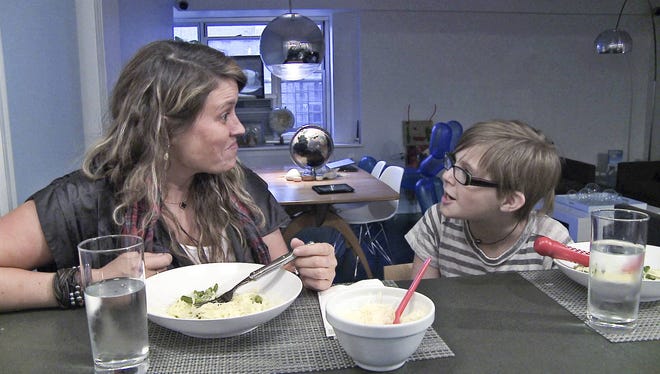When parents divorce, how NOT to treat the kids

- Divorce is 'overwhelming' for parents, who sometimes lose sight of their kids' feelings, needs.
- Kids say they don't want to be put 'in the middle,' need to be told it's not their fault.
- Give kids time to get used to the news.
They may have sad faces on the screen, but when these children of divorce offer advice to the adults in their lives, it also is a way to help any parent and child in the thick of a split.
In a do's-and-don'ts guide for divorcing couples called Don't Divorce Me! Kids' Rules for Parents on Divorce, HBO's half-hour documentary tells it from the kids' point of view. It debuts Thursday(6:30 p.m. ET/PT) and will be repeated several times through October.
The messages are very real: "Tell me it's not my fault," "Don't put me in the middle," and "Don't take your anger out on me." Child psychologists and divorce experts who were not involved with the documentary say kids have definite feelings about how the separation has affected them, but often parents' don't hear or heed the messages.
"We don't listen to kids enough," says Lisa Green, a psychology professor at Baldwin Wallace University in Berea, Ohio, who also is in private practice.
Cathy Chestler, 46, of Lake Bluff, Ill., says she was 7 when her parents divorced. She says those messages from kids ring true.
"I was the oldest, so I was put in the middle. I was the person who gave Mom the child support checks from Dad. I was the messenger," Chestler says. "When I got divorced, I vowed never to do that."
Chestler, the mother of two college students, also understands the parents' perspective.
"When parents get divorced, it is so overwhelming for the parent," she says. "Where am I going to live? The whole court process. The money to pay the lawyer. You lose sight of the kids in that because you're so emotionally wrapped up in your own divorce."
In 2009, Chestler co-founded DivorceCommunications.com, an encrypted, fee-based website that lets divorced parents exchange information, pay child-related expenses, download receipts and keep track of financial transactions and child visitation without direct contact.
The documentary, filmed last year, introduces more than two dozen kids whose common thread is divorce.
Among them are Grace Goss, 12, a seventh-grader in New York City. Her advice to parents: "When you're traveling from house to house, make sure it's very easy and you help your kids get all the stuff they need. We have a spot in the closet and anything that has to go to my Dad's house gets put in the closet so it's totally easy to go back and forth."
"We split school breaks and holidays. For Halloween and Easter, it's whoever has (us.) For Christmas and Thanksgiving, we switch off and on. We wake up at one house and then later go to the other house. All the breaks are split up evenly. It works out really well. You know ahead who has what break and it's much more organized."
Erin Delaney, who turns 12 next month, is a seventh-grader in Greenbelt, Md.:
Her advice: Parents should "spend a lot of time with the kids and do their best to make sure the kids know it's not their fault. I personally did not think it was my fault, but I know people who have. At least two or three of my friends had parents get divorced and at least one of them thought it was their fault."
Psychologist Green also has some advice direct from the kids.
"One of the biggest things I hear is 'Don't make me choose, ' " Green says. "It can be as large as which one they want to live with or as small as which one comes to the parent-teacher conference."
She cautions that parents need to respect their kids' belongings: "Their stuff is their stuff."
"If they get a birthday present, they should be able to take it to both houses," she says. "A lot of times, parents make them take off clothes they bought because they don't want those clothes going to the other parent's house. Once a child gets clothes or toys, it's the kid's. Parents shouldn't say 'You cannot take your iPod to Dad's house because it will get ruined.' "
Child psychologist Ben Garber of Nashua, N.H., says that in most divorces, kids don't require counseling. It's the 10%-20% that he terms "high conflict" that end up in his office. Garber, author of the 2008 book Keeping Kids Out of the Middle, says it's not just the divorce but rather "long-term exposure to this polarizing dynamic" that can harm kids when parents divorce.
"It impacts their ability to succeed academically and occupationally," he says. "In particular, it impacts their ability to make and maintain healthy adult relationships."
Carissa Carmichael, 10, a fifth-grader in the Cleveland suburb of Independence, Ohio says she and her two brothers are adjusting to their parents' divorce, which became final in July. Although they weren't part of the HBO program, she does have some advice for parents.
"Don't tell them a bunch of things about the divorce at once," she says. "Don't just blurt it out and expect them to handle it all right and not start crying. It takes at least a week to try to get used to it."